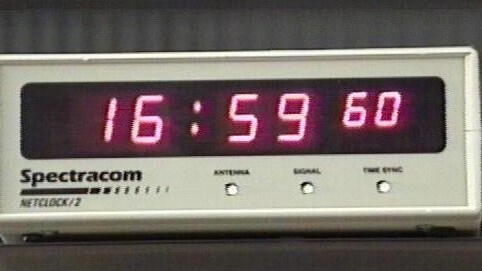
This Tuesday, a single second will be added to clocks around the world to help counter Earth’s rotation slowing down.
Called a “leap second,” it has been added approximately every 18 months since 1972 to rectify ‘lost’ time from the slowing rotation, ensuring that the atomic clock is in sync with Earth.
Humans can handle the additional second without even being aware of it, but computers aren’t quite accustomed to the path of time suddenly changing.
A leap second was last added to the clock in 2012, during a weekend, which wreaked havoc online.
It caused Reddit, Foursquare, Yelp, LinkedIn, Gawker and StumbleUpon to be knocked offline entirely, as well as hundreds of flights to be delayed in Australia.
Many issues were caused by a bug in the Network Time Protocol used to keep Linux system clocks in sync. The flaw caused NTP to lock up some systems entirely, requiring a reboot before they could recover.
When the leap second comes around, it means the system clock sees an additional figure, like so:
2011-12-31 23.59.57
2011-12-31 23.59.58
2011-12-31 23.59.59
2011-12-31 23.59.60 <– leap second
2012-01-01 00.00.00
2012-01-01 00.00.01
2012-01-01 00.00.02
The second will be inserted into network time services at the exact same moment worldwide, on June 30 at 23:59:60 UTC.
This time around it’s critical that businesses are ready, with the leap second being added during a time when trading on stock markets is open.
Some businesses are ready for the leap second to be added, like Google and Amazon, which adjust server clocks gradually over a number of weeks so that it’s not a sudden change.
Others that rely on time-critical systems — like stock markets and utilities — are nervous about it going wrong. A single second of downtime for a stock market means up to $4.6 million could be lost.
Linux systems shouldn’t break tomorrow — the bug that affected them last time has since been resolved, along with other issues found in Java and other operating systems.
The leap second is mostly a headache for system administrators who need to ensure their services are highly available and need to plan how to handle the change. Hardware providers such as Cisco now provide detailed advice on how their hardware handles the leap second, but the side effects are unpredictable.
Leap seconds might not be around for much longer with the International Telecommunications Union planning to vote on a proposal to eliminate the leap second in November 2015.
Impending doom aside, you can enjoy your extra second tomorrow by burning it on John Oliver’s site that shows you a random one-second video.
Get the TNW newsletter
Get the most important tech news in your inbox each week.





